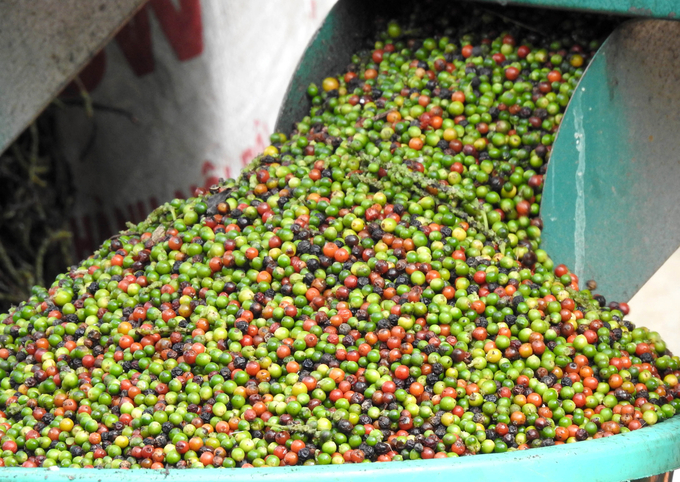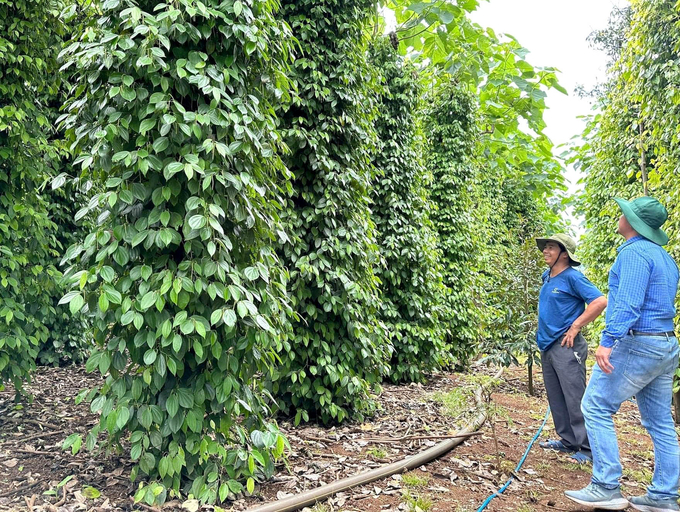November 24, 2025 | 02:33 GMT +7
November 24, 2025 | 02:33 GMT +7
Hotline: 0913.378.918
November 24, 2025 | 02:33 GMT +7
Hotline: 0913.378.918

Vietnam's pepper yield in 2024 is projected to be the lowest in the last five years. Photo: Son Trang.
According to the General Department of Vietnam Customs, Vietnam's pepper exports reached 13 thousand tons with an estimated turnover of 54 million USD in February 2024, marking a decrease of 23% in volume and a decrease of 220% in value compared to January 2024; a decrease of 52% in volume and a decrease of 35% in value compared to February 2023.
Vietnam's pepper exports reached 31 thousand tons with an estimated turnover of 124 million USD within the first two months of 2024, marking a decrease of 24% in volume and a decrease of 2.1% in value compared to the same period in 2023.
The sharp decline in pepper exports can be primarily attributed to the overall reduced yield. The Vietnam Pepper and Spice Association (VPSA) previously forecast a decrease of 10% in annual pepper yield for the 2023/2024 crop, with a total estimated volume of 170 thousand tons. However, according to assessments from several traders based on the current state of harvest across multiple pepper-producing provinces, this year's yield is estimated to reach approximately 140 to 150 thousand tons. On the other hand, Mr. Nguyen Tan Hien, Vice Chairman of VPSA, believes that Vietnam's pepper yield in 2024 will be the lowest in the last five years.
The sharp decrease in pepper imports in 2023 also affected Vietnam's pepper exports in early 2024. Vietnamese pepper businesses have primarily imported additional pepper from Indonesia, Cambodia, and especially Brazil to meet the demand for export orders. However, due to the reduced pepper yield across multiple countries and high prices in 2023, pepper imports to Vietnam decreased by 28% compared to 2022, reaching 27 thousand tons.

A pepper farm in Bu Dop district, Binh Phuoc province. Photo: Son Trang.
Vietnam's pepper yield in 2023 increased by 3.8% compared to 2022; however, pepper exports rose by 14%. Additionally, pepper imports remained relatively high, as previously reported. These factors led to a low inventory of pepper in Vietnam during the transitioning between 2023 and early 2024, which contributed significantly to the sharp decline in pepper exports in the first two months of 2024.
Farmers' reluctance to sell the recent pepper harvest has also had a considerable impact on Vietnam's pepper exports. Mr. Nguyen Vu, a farmer in Tan Binh hamlet, Tan Tien commune, Bu Dop district, Binh Phuoc province, shared that pepper prices in his area has steadily risen following the Lunar New Year holiday, with the highest level being 97,000 Vietnamese dong per kilogram. Similarly, the prices of organic pepper can reach up to 100,000 Vietnamese dong per kilogram. Despite these high prices, the majority of pepper-producing households stockpile their harvest, in anticipation that this year's pepper prices may reach over 100,000 Vietnamese dong per kilogram.
The decline in pepper export growth is expected to persist throughout March 2024. According to the General Department of Vietnam Customs, Vietnam exported 12 thousand tons of pepper in the first half of March 2024, which is 5,000 tons lower compared to the first half of March 2023.
Vietnamese businesses typically export the most amount of pepper during March. Namely, 36 thousand tons of pepper were exported in March 2023, with exports in the remaining months falling under 30 thousand tons. However, with the current scarcity of supply, it will be challenging for Vietnam's pepper exports to reach the 30 thousand-ton mark in March 2024.
Although domestic pepper yield is reduced and farmers are reluctant to sell their harvest, businesses are required to purchase pepper to fulfill their export orders. As a result, pepper prices in March 2024 have remained at above 90,000 Vietnamese dong per kilogram. At the beginning of this week, pepper prices in the Central Highlands and Southeast regions ranged from 92,500 to 96,000 Vietnamese dong per kilogram, which are the highest price levels since 2017.
The United States is the largest market for Vietnamese pepper in the first two months of 2024, with a volume of 31 thousand tons and a value of 37 million USD, marking an increase of 25% in volume and an increase of 29% in value compared to the same period in 2023. Additionally, the United States accounted for 28% of Vietnam's pepper export market share in early 2024, which is an increase from 23% in the same period of 2023.
Translated by Nguyen Hai Long
/2025/11/22/4018-4-213342_747.jpg)
(VAN) The Mekong Delta Agricultural Experts Club has attracted 143 experts and researchers to participate in providing consultancy and contributing initiatives to the development of one million hectares of high-quality rice.

(VAN) Ca Mau’s development of OCOP products opens a path to increasing cooperatives value, helping boost income, expand markets, and affirm collective economy's role.

(VAN) Turning seemingly ordinary coconut shells into unique jewelry and artwork, Nguyen Bang Nhi spreads the value of local culture through her brand, Cocohand.

(VAN) Results from the Sustainable Durian Model Project in Dak Lak have confirmed the critical role of Yara Viet Nam in transferring advanced nutritional solutions to farmers.

(VAN) In Tuyen Quang province, livestock farmers have introduced effective models and innovative practices that significantly strengthen African Swine Fever prevention and control efforts.

(VAN) This is the study conducted by IRRI and Can Tho University on the rice straw value chain in Mekong Delta showing an economic potential of more than 6.6 trillion VND/year.

(VAN) By participating in cooperative economics, many farmers in Tay Ninh have overcome hardship, mastered clean dragon fruit cultivation techniques.